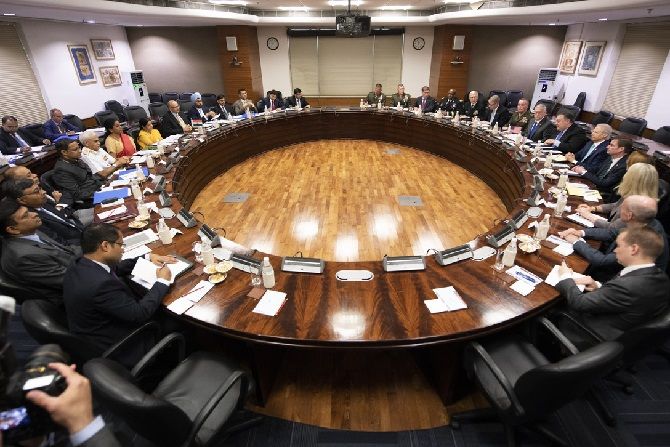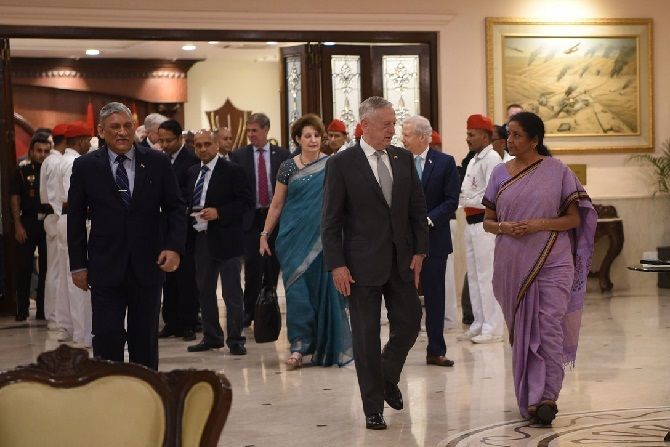'India appears to have stood its ground on strategic autonomy by resisting US pressure on Russia, China and Iran, but succumbed to the temptation to walk into a tighter embrace in defence cooperation, a high priority of the Trump administration,' notes Ambassador T P Sreenivasan.

The first important strategic dialogue between Minister of External Affairs Sushma Swaraj and Minister of Defence Nirmala Sitharaman and Secretary of State Michael R Pompeo and Secretary of Defence James N Mattis in the newly inaugurated 2+2 format ended in New Delhi with emphasis on continuity in defense cooperation, sidestepping the thorny issues of India's relations with Russia, China and Iran, which the US side had wished to raise.
The signing of a Communications Compatibility and Security Agreement -- COMCASA -- that was negotiated over a long period of time as part of strengthening India's status of a Major Defence Partner of the United States served to stress continuity in the relationship, despite the wish list carried by the US delegation to dictate terms to India on some fundamental aspects of India's foreign policy.
Showing COMCASA as a major outcome of the dialogue is misleading because we have been resisting it and the other fundamental agreements the US had been asking us to sign as a Major Defense Partner.
The Manmohan Singh Government had serious reservations aboout them. The US wish list may have been discussed, but the Joint Statement skirts those issues and stresses mutual cooperation, particularly in defence and combating terror.
The only hint of difference came when the US defence secretary made it a point to mention that the question of India's acquisition of S-400 missile defense system from Russia was not settled. It goes to the credit of both countries that the atmosphere of the dialogue was not vitiated by contentious issues.
The dialogue has been described in the Joint Statement as a 'reflection of the shared commitment by Prime Minister Modi and President Trump to provide a positive, forward-looking vision for the India-US strategic partnership and to promote synergy in their diplomatic and security efforts.'
Moreover, it recognises that the two countries are strategic partners, major and independent stakeholders in world affairs and are committed to work together on regional and global issues, including in bilateral, trilateral, and quadrilateral formats.
Apart from signing the COMCASA, India and the US have created a new tri-services exercise and agreed to further increase personnel exchanges between the two militaries and defence organisations.
They have also agreed to strengthen cooperation between the US Naval Forces Central Command and the Indian Navy, underscoring the importance of deepening their maritime cooperation in the western Indian Ocean.
The 2+2 dialogue reaffirmed the consensus on terrorism reached in Washington last year without diluting the clear denunciation of cross border terrorism from Pakistan though Pompeo had just visited Pakistan to greet the new prime minister. The reiteration of denial of anti-terror funding to Pakistan was also music to Indian ears.
The Wuhan summit and Prime Minister Modi's presentation at the Shangri-La dialogue on June 1, 2018 had indicated a dilution of the US embrace in the Indo-Pacific region and the same is reflected in the rather tame paragraph in the Joint Statement on the cooperation between the two countries.
The formulation is guarded when it states: 'Both sides committed to work together and in concert with other partners toward advancing a free, open, and inclusive Indo-Pacific region, based on recognition of ASEAN centrality and on respect for sovereignty, territorial integrity, rule of law, good governance, free and fair trade, and freedom of navigation and over flight.'
There is no mention of the Quadrilateral either, except as a forum for cooperation.
The shared commitment to a united, sovereign, democratic, inclusive, stable, prosperous, and peaceful Afghanistan and support for a peace and reconciliation process and India's role in Afghanistan's development does not reveal any forward movement.
The statement on North Korea is routine, but the reference to those countries that supported North Korea in its nuclear activities recognises Indian concerns.
The support to India's admission to the NSG has no operational element in it.
The demand for balancing trade, a favorite point of President Trump, is hidden in a seemingly innocuous section on trade. A sense of resignation is evident in the section on the civil nuclear energy partnership and the projected establishment of six nuclear power plants in India.
The various hurdles to nuclear trade between the US and India, such as the Liability Act have not been mentioned.

India appears to have stood its ground on strategic autonomy by resisting US pressure on Russia, China and Iran, but succumbed to the temptation to walk into a tighter embrace in defence cooperation, a high priority of the Trump administration.
But given President Trump's to reshape the world according to his own lights, the reprieve may well be temporary.
The ministers have done their best in papering over differences, but a tweet from Trump will blow the papering and reveal difficult options for India.
What we seem to be doing is to look beyond President Trump and safeguard the established avenues of cooperation for consolidation of the relationship at a future date.
Many abroad and some in the Trump administration itself entertain the fear that present US foreign policy is not in America's interest itself.
An anonymous op-ed published by The New York Times recently by a senior Administration official expressed his dilemma in these words: 'Take foreign policy: In public and in private, President Trump shows a preference for autocrats and dictators, such as President Vladimir Putin of Russia and North Korea's leader Kim Jong-un, and displays little genuine appreciation for the ties that bind us to allied, like-minded nations.'
'Astute observers have noted, though, that the rest of the administration is operating on another track, one where countries like Russia are called out for meddling and punished accordingly, and where allies around the world are engaged as peers rather than ridiculed as rivals.'
Perhaps, Secretaries Pompeo and Mattis may also have such thoughts. In which case, Ministers Sushma Swaraj and Nirmala Sitharaman may be able to put the new hotline with Washington to good use.
T P Sreenivasan (IFS 1967) is a former ambassador of India and governor for India at the IAEA, chairman, Academic Council and director, NSS Academy of Civil Services, director general, Kerala International Centre.






 © 2025
© 2025